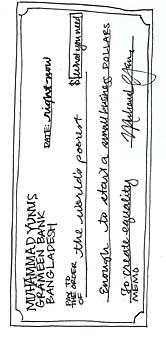Last Friday, Muhammad Yunus, an economist from Bangladesh, and his Grameen Bank, were awarded the Nobel Peace Prize – the first ever awarded to a for-profit business. Yunus has committed his life to promoting world peace and ending global poverty – and he has done it by providing $20 loans to peasants who don’t even have to sign for it. Get ready for the story the Young Socialists don’t want you to read.
In 1976, Yunus saved 42 impoverished villagers in Chittagong, Bangladesh. He did it with $27. Yunus realized that by providing very small loans so that peasants could buy a basic sewing kit or other small- to medium-size items of production value, he could essentially “”teach a man to fish.”” He could provide ways for the desperately poor to achieve economic independence.
The concept came to be known as micro-credit lending. The basic model has remained relatively simple for 30 years: Provide small loans (the majority of Grameen’s loans are under $200) to the poor so they can purchase means of production and produce goods they can sell at local markets.
The idea is radical. Loan out money, any amount of money, to entrepreneurs with no business experience, contracts or collateral? Indeed, many of the loan recipients had been turned down by all the other banks in Bangladesh for exactly these reasons.
The way in which Grameen Bank guarantees repayment is truly remarkable. In place of contracts or a security, Yunus and his bank require prospective loan recipients to apply in groups of five. The result? All recipients serve as guarantors on the other’s loan, and no one wants to be the shameful debtor in their group of five friends.
Sound crazy? Grameen Bank receives repayment on more than 95 percent of its loans.
Since the inception of micro-lending, Yunus and his Grameen Bank have provided over $5 billion in loans to more than 5 million impoverished people. On top of that, more than 95 percent of Grameen’s loan recipients are women. In a country where females are hit disproportionately hard by economic strife, almost the entire population of micro-borrowing self-starters are women, breaking the cycle of poverty and creating independence for themselves and their families.
And the concept is spreading. More than 100 countries now have some kind of private micro-credit lending service, providing relief and economic independence for millions of citizens of the world’s poorest countries.
Millions worldwide are being lifted out of debt – and they are doing so without state aid, higher taxes or federal consolidation and redistribution of goods. Yunus is providing an answer by simply creating inexpensive ways for the poor to help themselves – and he will continue to do it because, well, there is money in it for him, too.
This is the unsung heroism of capitalism. It is the side of free market economics that gets little attention from melodramatic news providers and
ignored by left-of-left wingers. It is the side of the profit motive that never seems to be as newsworthy as corporate greed and capital flight.
But it is the side that must get more attention in the public discourse. It’s time for peace-committed people everywhere to recognize that the free market and the profit motive create prosperity – and not just for American CEOs, but, as the Bangladeshi case illustrates, for otherwise starving candy makers and shirt producers.
It is wonderful that the Nobel Committee is recognizing and rewarding the humanitarian side of capitalism. By acknowledging the work of Yunus and the Grameen Bank, the committee is setting an example that the international community understands and appreciates the kind of prosperity and harmony that the proper, transparent and legal use of an open market and the profit motive can usher in.
And it’s high time with we follow their example.
Yunus has demonstrated that by doing something very small to help poor women turn themselves into capitalists with means to produce, millions can throw off the yoke of destitution and become independent and prosperous members of their societies.
Thank you Yunus. The whole world owes you a debt of gratitude.
Stan Molever is a senior majoring in philosophy. He can be reached at letters@wildcat.arizona.edu









